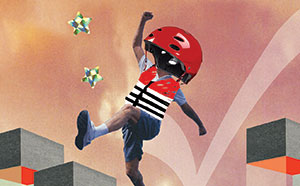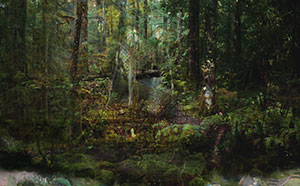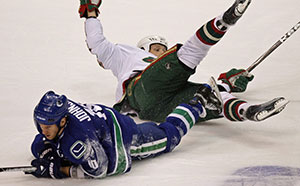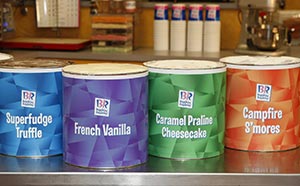Basically, there are two types of game shows: the kind that gets you on
television while testing your intellectual mettle or your capacity to crack a puzzle (Jeopardy!, Wheel of Fortune, Match Game); and then the kind that just gets you on television. In this latter category, let’s group The Price Is Right, Supermarket Sweep, and all those tacky, Chuck Barris–produced parades of human loneliness, like The Dating Game and The Gong Show. With few exceptions, Canadians have gravitated toward the first variety.
Historically, our game shows have been marked by a certain modesty. They’ve tended to trade in the gaudy glory of getting your grinning mug on TV for the humble dignity of untangling some formulaic puzzle. Take Definition, which ran on CTV between 1974 and 1990. Hosted by Jim Perry, the show had pairs of contestants compete in an upturned version of Wheel of Fortune, in which they gave away unwanted letters to solve a hangman-style puzzle. The answers, usually sent in by viewers, took the form of puns (so the response to the clue “What a very, very large woman tries to do” would be the nominally clever “X her size”).
It was modestly challenging. And modestly entertaining. And the stakes were notoriously low, with challengers usually vying for such laughably cheap prizes as pen and pencil sets, knife blocks, and small consumer appliances. It was fun, sure. But unless you were on the show, or tuning in to see if the producers had hand-picked one of your puzzles, it wasn’t exactly appointment viewing. Any recognition was humdrum, on par with an employee of the month plaque or one of those form letters you get from the prime minister when you’ve been married for fifty years. Such was the case with a slew of other Canadian quiz shows, like Acting Crazy, Pitfall (hosted by a young, bushy-haired Alex Trebek), Anything You Can Do, and Headline Hunters, which failed to make much of an impression on a captive nation of home viewers.
All that changes this spring, though, with the debut of Wipeout Canada, our own version of the immensely popular American program. When it premiered on ABC in June 2008, Wipeout seized on the swell of such reality competitions as American Idol, America’s Got Talent, and other programs responsible for shaving down the fifteen minutes of fame we’re all duly accorded to a tidy fifteen seconds. Wipeout turned everyday Americans into fresh meat fit to be ground through an obstacle course of rotating gears, foam blades, and onrushing barrels. As the name suggests, athleticism isn’t necessarily at a premium. While the goal, on paper at least, is to traverse an obstacle course in record time, the show’s true pleasures arise from seeing contestants slip, fall, smack their heads, and otherwise wipe out. Whoever sets the best time while enduring four rounds of degrading, sporty slip-ups wins $50,000. Easy.
Wipeout borrows heavily from Takeshi’s Castle, a popular Japanese program from the ’80s that epitomized humiliation-based game shows. Airing in the US and Canada in an edited, over-dubbed, snarked-up translation called MXC (for Most Extreme Elimination Challenge), it subjected hordes of cartoonishly enthusiastic participants to a sado-comic gauntlet of challenges. Highlights included Knock Knock (contestants plow through thin walls while avoiding, say, a man in an oversized samurai costume wearing boxing mitts), Avalanche (contestants scramble up a narrow chute while a massive prop boulder careens toward them), and Slippery Wall (exactly what it sounds like). Like any worthwhile entertainment, Takeshi’s Castle (and MXC) was alternatingly comic and tragic—perfect viewing for kids, stoners, and anyone who happened on the program while channel-surfing.
Nobody would ever confuse the Canadian version for something as odd or stupefying as Takeshi’s Castle. But with its glossy production, $50,000 in prize money (which can buy many pen and pencil sets), and roster of relatively immodest contestants, Wipeout Canada doesn’t much resemble a Canadian game show either.
In a preamble to the debut episode, co-host Ennis Esmer boasts that Wipeout Canada provides the opportunity to “show the world just what us [sic] Canadians are made of.” The claim is a bit misleading, given that a) the appeal of seeing some schlub from Niverville, Manitoba, slide into a pool of crud is probably limited to a viewer in Arkansas or Denmark or Brazil; and especially because b) most developed nations have by now imported their own versions of the program (many of which, like Canada’s, are filmed on the same course, located in Argentina). What Wipeout Canada does offer, though, is something even more urgent and compelling than the chance for Canadians to flex a little on the global stage (or at least the humiliation-based game show part of the global stage). It offers the opportunity to show Canada just what we Canadians are made of.
When Wipeout Canada was announced last June, producers encouraged ordinary Canadians to make videos demonstrating their suitability as Wipeout contestants and upload them to YouTube. The response was phenomenal. In Ottawa, Crystal Grierson filmed herself flopping into an above-ground pool. In Labrador City, Vanessa Simon dressed up as a superhero called the Newfie Bullet and successfully solicited an endorsement from the mayor. One guy tied himself to a Dodge Caravan and pretended to tow it around the GTA burbs, the driver barely visible. The hopefuls were diverse in talent but alike in enthusiasm, in their collective readiness to yell, scream, get wet, and generally engage in behaviour that in any other context would appear asinine.
The ideal Wipeout contestants are boastful, even arrogant: “daring Canadian thrill and spill seekers,” according to the original press release. Competitive, pugnacious Type A personalities. The kind of people who drink eight glasses of Gatorade a day. They’re larger than life, in a way that can only be described by hazy expressions like “larger than life.” They’re people like Heather Westmacott, the “Yummy mummy with a washboard tummy,” who traverses the warren of narrow beams, oversized rubber balls, and robotic boxing gloves while the hosts trade intergenerational sexual innuendoes over a knock-off version of “Mrs. Robinson.” Or like Phil DeMers, a marine mammal trainer from Niagara Falls whose wipeouts warrant the corresponding puns (“Oh, man-atee! He Niagara Falls into the water!” and so forth) as generously deployed bonk, boink and a-wooga! sound effects punctuate the audio track. The producers call them “characters,” a vaguely sinister term that also makes sense. It suggests they’re something other than just people, and helps distinguish the 260 folks who made the final cut (culled from an estimated 40,000 applicants). It enlivens their fifteen seconds of fame.
So here the real stakes set out by Wipeout Canada become apparent. It’s not just the chance to take home $50,000, or the dubious triumph of surviving the Wipeout Course—referred to in the program’s opening, more than a little sarcastically, as “a storied shrine to competition, athleticism, and achievement.” It’s about bragging rights, about being able to say you endured (or at least attempted) the Wipeout Course—about the glory of simply being on TV. It’s the whole reality show mentality that has dominated the past decade or so of American television, now trickling down into our own knock-offs (Canadian Idol being the most potent, and popular, example). It’s a trend that has been met as much with inflated ratings as with hyperbolic hand-wringing, especially of late.
Last year, when cunning Canadian TV producers announced the reality show Lake Shore—in which unlikeable GTA club kids are locked up together in a loft and forced to interact in a more multicultural adaptation of MTV’s Jersey Shore—some pop culture critics went so far as to condemn it as the harbinger of some coming cultural super-storm. Darren Franich at Entertainment Weekly summed up the show’s potential thusly: “Canada’s Jersey Shore will either save civilization or destroy it.” Even reality TV has been supplanted by some mean-spirited ersatz version of itself. Given Wipeout Canada’s light masochism, it’s easy to chalk up its appeal to pop culture’s larger backslide into oblivion. But it’s also a bit dismissive.
The show has a terrific sense of humour about itself. (How could it not? One of its more famous obstacles is called Big Balls.) And compared with a program like Lake Shore, which appears to be a mere study in how nasty racial tensions will flare when a bunch of nasty racist stereotypes are forced to interact with one another, Wipeout comes across as innocent—refreshingly so. (Lake Shore, it must be said, has yet to find distribution.) Even Canadian Idol, like its American cousin, nudges us into laughing at so many of its naively out-of-tune hopefuls. Wipeout may be bigger, dumber, and glossier than any previous Canadian game show that preceded it, and there’s also a recognizably Canadian cheapness, reflected in the red and white decor, and the tiny Maple Leafs emblazoned on the robotic boxing gloves. Backed by the announcers’ strained comic interplay, it’s also pretty charming.
Nobody would be dopey enough to mistake Wipeout Canada for highbrow programming. But at least it’s honest. The contestants are willing participants in their own humiliation. Because it’s impossible to laugh smugly at a contestant who’s already wearing a hat shaped like a wedge of Swiss cheese, or someone who slaps on a cape and calls herself the Newfie Bullet, we can comfortably take pleasure in their dippy indignities. The show is an inclusive, oddly incorruptible funhouse mirror version of the apocalypse that dumb TV heralds. The slide whistles sound! Cue the ruinous rain of Ping-Pong balls! The Armageddon of absurdity! As a proving ground for Canadians keen, even desperate, to get on TV, Wipeout Canada is about as modest as a wet T-shirt contest. But why do it any other way?
Besides being Canada’s first real-deal, big-time game show competition, it’s the only homegrown program in the spring lineup that offers a solid hour of heroic tumbles accompanied by Chad Kroeger jokes and laboured allusions to Lucy Maud Montgomery novels. If it’s not a sign of the end times, it’s at the very least appointment viewing.
This appeared in the June 2011 issue.





